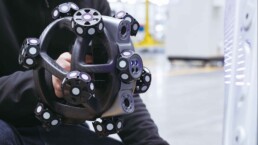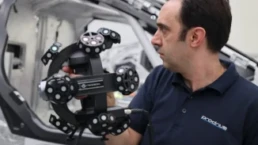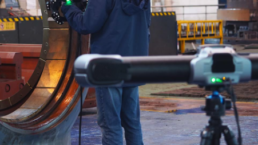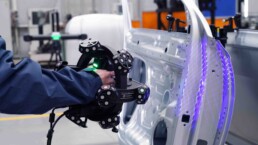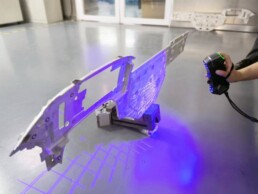
With a focus on reducing weight without compromising on durability, aluminium has become a pivotal material in the automotive manufacturing process. Its application extends to various automotive components such as engines, doors, hoods, all contributing to a significant reduction in the weight of vehicles.
The 6000-series alloy aluminium, which undergoes heat treatment to satisfy customer strength requirements, is the most prevalent material used in vehicles. When heat-treated, an aluminium alloy can surpass some steel grades in strength while maintaining its lightweight and malleability characteristics. However, the structural durability of aluminium components is often perceived as their most significant drawback. This necessitates meticulous inspections by manufacturers to guarantee that the parts fulfil stringent production requirements.
3D Analysis for Aluminium Castings in Automotive Applications
A company specialising in the production of lightweight metal components, services various industries including automobile manufacturing, 3C electronics, and aerospace among others.
The client utilised Scantech’s handheld 3D scanner, SIMSCAN, to gauge the aluminium castings they produced. This enabled them to identify any deformities and make necessary adjustments based on the data acquired.
“Previously, we would dedicate an entire day to adjusting a single component. However, with Scantech’s 3D scanner, we’ve managed to decrease the time spent on measurement, inspection, and adjustment to just an hour. Not only that, but the portability of the 3D scanner allows us to evaluate more components, significantly increasing our efficiency and optimising our inspection workflow.”
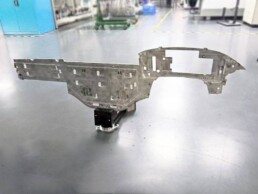
The Solution: SIMSCAN 42
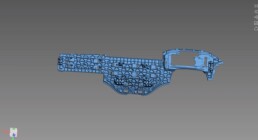
Compact and Ergonomic 3D Scanner for Infinite Measurements
The portable 3D scanner SIMSCAN distinguishes itself from conventional measurement techniques with its ability to function equally well in a lab or on the shop floor. Its lightweight (570g) and compact design allows it to be easily transported, making it particularly useful for scanning in confined spaces.
Boosting Efficiency to Streamline Operations
Traditionally, engineers hand measured manufactured parts to identify any deviations. They then adjust the part through heat treatment based on these measurements, followed by another round of measurements to ensure the finished product meets the set requirements. This process typically takes an entire day, with new parts only being worked on after the completion of adjustments on the previous part—a time-consuming procedure. However, using Scantech’s portable 3D blue laser scanner, a part can be measured in just 3 minutes. Owing to its advanced algorithm, SIMSCAN significantly enhances efficiency for users. Apart from its quick scanning capability, its portability enables engineers to measure parts while the previously scanned part is still being adjusted. This optimises inspection workflows and saves precious time.
Full-Field Inspection with Comprehensive Data
The SIMSCAN excels at capturing intricate details due to its shorter camera distance compared to traditional 3D scanners. This results in a sharper viewing angle, ensuring the scanner’s view remains unobstructed. Traditional measuring methods like verniers, rulers, and micrometres can be laborious and time-consuming. They can measure basic attributes such as width, height, and depth, but struggle with curvatures and concave surfaces. With the handheld SIMSCAN, users can capture comprehensive 3D data, providing deeper insights into product quality.
Clear, Easy-to-Understand Reports
When used with the 3D software ScanViewer, SIMSCAN combines scanning and inspection into a single tool. It can compare captured 3D data with original models to produce clear, easy-to-understand reports. This data can then be used to make heat treatment adjustments to parts.
Easy-to-Use Even for Beginners
Scantech’s handheld 3D scanners boast intuitive operations, making them easy to learn and use. T3DMC also provides professional system training services to help users familiarise themselves with the device, ensuring smooth 3D scanning. Whether you’re a novice or a pro, these 3D scanners can be used immediately after simple training, helping companies reduce labour costs.
The automobile aluminium casting industry’s market share is projected to grow by 20% annually, driven by the rapid development of new energy vehicles and increased demand for aluminium casting parts. High-quality 3D scanning measurement solutions will assist light metal materials enterprises in their transformation and upgrading processes. Scantech will continue to offer comprehensive 3D solutions for automobile manufacturing, helping businesses excel in the competitive automotive market.
Other news articles
7th February 2024
Revving Up Innovation: T3DMC Becomes Prodrive’s Official 3D Scanning Partner
Explore how our 3D scanning partnership with Prodrive is accelerating advancements in motorsport and driving innovation.
29th August 2023
Preserving History With 3D Scanning Technology: The Mk2 Cockle Canoe, Operation Frankton
Preserving history with SIMSCAN. Capturing 3D data of WW2's unsung hero, Operation Frankton's Mk2 Cockle Canoe.


